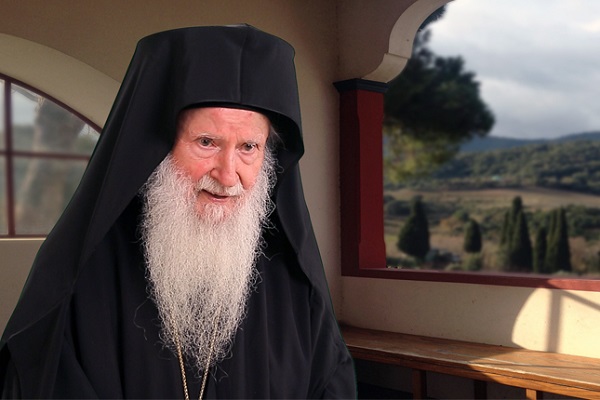Sermon on the Apostolic reading – 7th Sunday of Luke (Hebrews 9:1-7) (Metropolitan of Pisidia Sotirios)
28 Οκτωβρίου 2018
The Apostolic Reading for today is from the letter sent by the Apostle Paul to the Hebrew Christians. In this letter, the Apostle of Christ wants to affirm to the Jewish Christians that Jesus Christ is the Messiah who the Prophets spoke about, and is therefore greater than all the prominent personalities of the Old Testament. He also speaks of Christian worship being higher than the worship of the Israelites, as the sky is from the earth.
First, The Apostle Paul presents the Covenant (Tabernacle), which the Jews used for their worship: In the center, there was the Ark of the Covenant covered with gold. Inside this gold plated box was kept the golden pot, which contained the manna that had famously poured down upon the Israelites by miracle in the desert for forty years (Exodus 16:33). Also inside were the tablets of the Covenant that Moses received on Mt. Sinai from God, which had the commandments of God engraved on them (Exodus 31:18). And then there was the rod of Aaron, which miraculously sprouted buds on it to show that God had chosen Aaron as His high priest (Numbers 17:23).

Now let’s look at the similarities in the Orthodox Church: At the center of the Holy Sanctuary there is the Holy Table, which is also called the Holy Altar. During the Divine Liturgy, there is not the bloody sacrifice of animals like the sacrifices of the Tabernacle, but the bloodless Sacrifice of Jesus Christ, as He delivered Himself to His disciples in the Last Supper.
Also on the Holy Table, instead of the Tablets of the Ten Commandments, we have the Holy Gospel of the New Testament, with the completed Commandments and the Word of God.
Finally, instead of the manna, the material food of the Israelites, is the Holy Artoforion, which is on the Holy Table of every Orthodox Church. This is the “Heavenly Manna” that is the precious treasure of the Holy Body and Blood of our Lord Jesus Christ, preserved there at the Divine Liturgy of Great Thursday.
Most importantly, however, was that in the Tabernacle the high priest Aaron and his successors offered sacrifices for the forgiveness of sins (their own sins and that of the people). In the Christian Church, Jesus Christ, the Son of God is the High Priest (see Hebrews 4:14), and celebrates the Holy Sacraments. The priests and archpriests are servants of Jesus Christ. The phrase in the Divine Liturgy of the Great Basil is characteristic: “keep Your servants the deacons in Your holiness” (last prayer of the Liturgy). Basil the Great, while he was Archbishop, decides to characterize himself and all the other archbishops who celebrate the Divine Liturgy as “servants.” The fact that our Lord Jesus Christ, as the Archpriest, celebrates the Mystery of the Divine Eucharist in the Divine Liturgy and all other Mysteries, is also shown by the way the priest or Bishop offers praises: “You, Christ our God, are the Offerer and the Offered, the One who receives and is distributed…” (Prayer of the Cherubic Hymn). And in the Prayer before Holy Communion: “Lord Jesus Christ our Lord…who are invisibly present among us, come and sanctify us, and let Your pure Body and precious Blood be given to us by Your mighty hand and through us to all Your people.”
What honor and blessings for the faithful Christian! Christ Himself, in the sacrifice of His blood, cleanses our conscience from the works that lead to death, so that we may worship the true God (cf. Hebrews 2:14).
Let us finish with the exclamation of the Apostle Paul: Therefore, my brothers having a Great Priest Jesus Christ over the house of God…do not abandon our worship-gatherings-in the Church-as is the manner of some, but exhorting one another (Hebrews 10:21&25) frequently and unceasingly to come to the Church.





